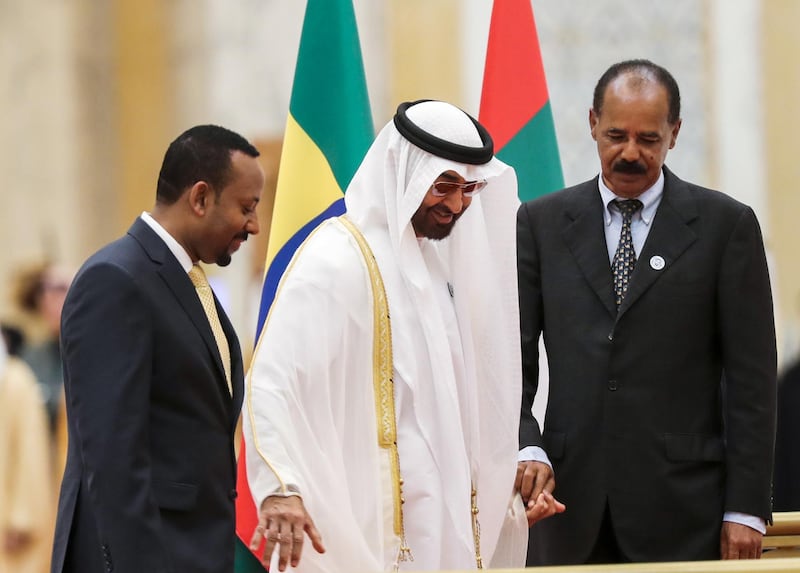Colourful celebrations marked the opening of border points between Ethiopia and Eritrea yesterday, promising future trade and regional integration in a historic warming of relations between the former foes.
Ethiopia’s reformist Prime Minister Abiy Ahmed and long-time Eritrean President Isaias Afwerki met on the border, along with military personnel, for the opening of two border crossings connecting Ethiopian towns to Eritrean ports.
“We heralded the new year by demolishing the trenches along our border,” Mr Abiy said, referring to Ethiopia’s New Year, which was celebrated yesterday.
“As of today, Ethiopia’s defence forces along the border with Eritrea will be gathered to camps to ease tension that was often extreme. The same will be done from the Eritrean side.”
The Debay Sima-Burre crossing, site of some of the fiercest fighting in the 1998-2000 war, was opened first.
Then, the Serha-Zalambesa border, which will link the capital of Ethiopia’s Tigray region with Eritrea’s capital Asmara, was opened in a ceremony shown on Ethiopian state TV.
“This is the happiest day of my life,” Eritrean Ruta Haddis said. “I never thought this would take place in my lifetime.”
The border openings follow the brokering of a peace deal, assisted by the UAE.
Yesterday’s meeting fulfils a promise Mr Abiy made to Mr Afwerki early in the peace process to celebrate Ethiopia’s new year together in Asmara, a sign that rapprochement is taking shape.
Mr Abiy’s election in April was a turning point.
He has implemented a series of reforms, reshaping the political landscape of the Horn of Africa.
Symbolically, the meeting was a reaffirmation of both side's commitment to peace, but the economic effects of a porous border between the two countries might take some time to emerge, Ahmed Soliman, a research fellow at Chatham House's Africa Programme, told The National.
“It shows trade is going to start but it is unclear whether it will be trade with no barriers across the border, or will the two currencies be inhibiting factors?” Mr Soliman asked.
“And do they need some sort of mechanism to help businesses pay for goods in either country?”
The effects of increased trade between the countries could extend through and beyond the Horn of Africa, and across the Red Sea to the Arabian Gulf.
“Ultimately we may see if the trajectory continues as it is,” Mr Soliman said.
“It could be of real benefit to expanding markets from the Gulf.
“We talk about just the trade between Ethiopia and Eritrea, but it’s the beginning of trade between several different countries and a new kind of relationship between those countries.”
Improving the capacity of ports in Eritrea will be necessary for the economic effects of co-operation to take hold, he said.
_______________
Read more:
UAE minister visits Ethiopia to discuss joint co-operation
Former rivals hail UAE's role in bringing peace between Ethiopia and Eritrea
Editorial: UAE's quiet diplomacy will help ensure peace in the Horn
_______________
The important ports of Massawa and Assab require upgrades to compete with rival sites in Djibouti.
“There’s a new regional reality that’s emerging and that will take hold first, and the economic side of things will come along with it,” Mr Soliman said.
“You can see it through physical infrastructure that’s being built, through the port routes, through the roads, and the UAE is a part of that.
“It is about increasing connectivity.”
Eritrea’s Information Minister and Mr Abiy’s chief of staff announced the opening of the border crossings on Twitter, with pictures of delegations celebrating the occasion.
President Isaias Afwerki & Prime Minister Abiy Ahmed today officially opened the Debay Sima - Burre border point between z two countries for road transport connectivity. The two leaders will arrive in Asmara shortly & proceed to Serha-Zalambesa connection for a similar ceremony pic.twitter.com/7zRZJhGKNl
— Yemane G. Meskel (@hawelti) September 11, 2018
Citizens lined the streets in brightly coloured clothes, carrying national flags while troops stood at attention.
Mr Abiy was dressed in camouflage colours and Mr Isaias wore an olive safari suit and sandals.
Since signing a peace agreement on July 9, the two leaders have moved swiftly to reconnect roads, telephone lines and diplomacy.
Eritrea reopened its embassy in Ethiopia in July, and Ethiopia reciprocated last week.





